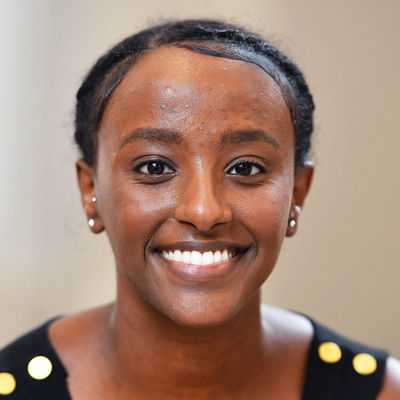Helina Haile

Helina Haile is a master of global affairs student at the Keough School. Helina served as a U.S. Peace Corps Volunteer in Rwanda, where she taught English and led after-school youth development groups for boys and girls. She also spent time with American Refugee Committee Rwanda as a program development volunteer. Helina later worked on racial equity issues with AmeriCorps VISTA and the City of Minneapolis for the Obama Promise Zone Initiative, and served as a legal assistant for the Minnesota AIDS Project. She holds a BA in political science and international studies from Northern Michigan University, and speaks Amharic and is conversant in Kinyarwanda. Helina is the recipient of a Thomas D. McCloskey Peace Fellowship.
“It is work that requires patience as changes cannot always be witnessed. This also means it requires a certain level of hope and faith to continue on this path even when chances seem bleak.”
What has inspired your interest in civil and human rights?
My interest in civil and human rights comes from my experience growing up in the U.S. as an Ethiopian immigrant. My existence at the intersection of being black, a woman, and an immigrant has profoundly shaped me. Daily experiences with racism, sexism, and xenophobia have shaped my understanding of social justice as it relates to civil and human rights.
My passion grew as I worked as a Peace Corps Volunteer in Rwanda, a country still grappling with efforts of reconciliation, forgiveness and transitional justice. Afterwards, I returned to the U.S. to work on issues of racial equity and services for people living with HIV/AIDS. Whether here at home or abroad I saw the need for advocacy, protection of rights and the need to combat social exclusion.
I draw inspiration from those who came before me and paved the way, my tribe that surrounds me with unconditional love and support to continue to do this work, and those who will come after me for I hope things are better for them.
Are there aspects of the field you feel most committed to?
The emphasis of my study at Notre Dame is international peace studies with interests in racial equity and genocide prevention. From my experiences domestically and internationally, I believe that protecting the rights of oppressed peoples and minorities are crucial and much needed in today’s world. I believe in peacebuilding to combat the presence of structural violence. Therefore, I’m determined to address these issues through changes in policy and law to address the systematic and institutional forms of oppression that exist in our society.
What challenges do you think are the most difficult?
I think representation is an obstacle in doing the work I'd like to do in peacebuilding. There is a lack of representation in regards to peacebuilders of color both from the global south and global north. I think it's crucial that people of color from the global north - especially those who identify as descendants of African chattel slavery, indigenous peoples, diaspora, and first generation immigrants, are included in the discussion of modern day peace building efforts. This would help to broaden peacebuilding discussions as well as highlight the need for peace building efforts in Western nations as well.
What path forward do you see as most promising?
With regard to the field of peacebuilding, systemic structural violence and injustice seem vastly overwhelming to tackle. It is work that requires patience as changes cannot always be witnessed. This also means it requires a certain level of hope and faith to continue on this path even when chances seem bleak.
In order to build peace for civil and human rights, I think the path forward must be holistic and inclusive. The work to be done will require changes on a personal, institutional and systemic level. Therefore, we all have the chance to make an impact to move the needle forward for justice. The most important questions to ask in the field of peacebuilding is “How does our peace building work include justice? How are we combating structural violence and not just being complacent in maintaining oppressive power dynamics?” As individuals engaging in this work we must always be critically conscious of our own agency, power and privilege as we attempt to build peace in order to do no harm while in the process.